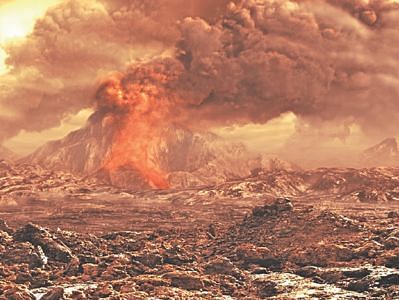Will Earth become a dead ball of rock?

Surface of Venus
Out of the four terrestrial planets in the solar system, three are “dead balls of rock.†Earth is the only dynamic planet with an atmosphere of nitrogen and oxygen, has liquid water and a temperature range conducive to life. But seldom do we pause to ponder that our planet, filled with exquisite beauty, a cornucopia of boisterous wildlife slithering, scampering, soaring, and swimming, could one day become a barren wasteland unable to support life in any form whatsoever. Unfortunately, with the current state of human activities, this nightmarish vision may not be too far off in the future, but instead a grim reality that is knocking on our front door. The cause of this calamity will be the greenhouse effect, a natural process that is critical to the existence of life on Earth. It traps infrared radiation by slowing its return to space and keeps Earth as a temperate and a habitable planet, as opposed to unforgiving tundra.
When the greenhouse effect becomes far more intense and spins out of control, it is called “runaway greenhouse effect.†It happens when there is a large imbalance between energy received by a planet from the Sun and the energy radiated back to space. Venus, named as Earth's “evil twin,†is an example of this effect.
Several billion years ago, Venus was cooler than what it is now and had abundance of water in oceans overlain by an oxygen-rich atmosphere. Also, most of its carbon dioxide was locked up in the rocks and in ocean water. As Venus heated up due to its proximity to the Sun, carbon dioxide in the rocks was "baked out" and ocean water evaporated into the atmosphere. The increase of atmospheric carbon dioxide and water vapor accelerated the greenhouse heating, causing more ocean evaporation and baking out of carbon dioxide. This induced a “positive feedback loop†process that made the atmosphere opaque to infrared radiation emitted by the planet. Venus was thus snared into a vicious cycle of runaway greenhouse effect that rapidly raised its surface temperature to a blistering 480 degrees Centigrade hot enough to melt lead.
The greenhouse effect on Venus is so cogent that there is very little temperature difference between Venusian equator and poles; day and night temperatures are almost same. The hellish condition on Venus is a stark reminder of how carbon dioxide can wreak havoc as far as heating up a planet is concerned.
Unlike Venus where nature went out of control, on the cooler Earth, surface water maintains equilibrium with atmospheric water vapor limiting further evaporation. Additionally, much of the naturally occurring carbon dioxide is in the ground or in the oceans. Nonetheless, Earth has an enhanced greenhouse effect, and the synergistic feedback of continued emission of greenhouse gases is indeed capable of generating a runaway greenhouse effect. We should be particularly concerned about carbon dioxide because it's concentration in the atmosphere is increasing at a prodigious rate largely from burning fossil fuels.
Is it possible for solar radiation to push Earth toward runway greenhouse effect, just like it did to Venus? The current amount of solar radiation received by Earth is not going to drive the planet to the point where lead will melt or oceans will boil away. So, the threat of a runaway greenhouse effect due to solar radiation alone is unlikely in the foreseeable future. However, our oceans will start to boil away at a brisk rate when the Sun's luminosity will increase by about 10 percent one billion years from now. This will certainly trigger a runaway greenhouse effect.
We may not have to wait that long for the disastrous Venus syndrome to afflict Earth. Scientists already detected the signature of a runaway greenhouse effect in the Western Pacific just northeast of Australia. Moreover, it is estimated that the entire “proven†reserve of fossil fuels, including shale oil and tar sands, will be depleted in a few hundred years. The amount of carbon dioxide that will be released in the process will be enough to transform Earth into today's Venus that has possibly surpassed even Dante's vision of hell. Our planet will still keep on spinning, but as the fourth dead ball of rock.
British physician Havelock Ellis was 100 percent correct when he wrote in The Dance of Life: “The sun, the moon and the stars would have disappeared long ago had they happened to be within the reach of the predatory human hands.â€

 For all latest news, follow The Daily Star's Google News channel.
For all latest news, follow The Daily Star's Google News channel. 



Comments